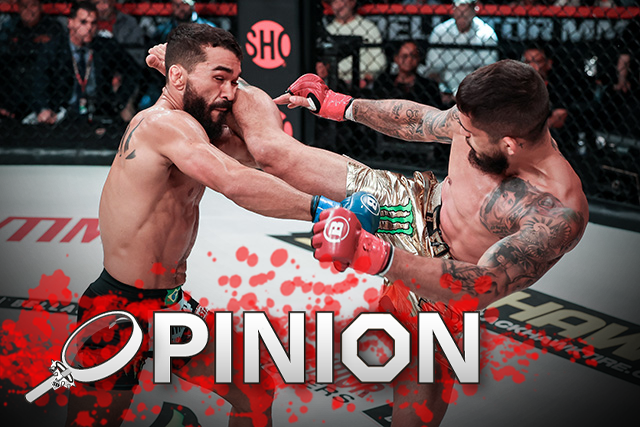Opinion: The Limits of Greatness

Editor’s note: The views and opinions expressed below are those of the author and do not necessarily reflect the views of Sherdog.com, its affiliates and sponsors or its parent company, Evolve Media.
Advertisement
The greatest fighters in MMA history do not just impress or astound but capture one's imagination. They make one believe that anything is possible, including feats one would ordinarily scoff at. They cause a fan to fully buy into the fantasy, to believe that no boundaries to their achievements exist. And yet, harsh reality is undefeated. The limits of age, evolution, size and bad matchups are overwhelming, no matter how great the adversary.
The most recent example of this was Patricio Freire, a superb champion who I consider one of the 20 greatest fighters ever. He aimed high, seeking to become the first world champion in three different weight classes in a top promotion by defeating Bellator MMA bantamweight king Sergio Pettis. Freire had accomplished unlikely greatness in the past. Despite arguably being undersized at featherweight, he had gone up to lightweight to challenge Bellator lightweight champion Michael Chandler in 2019. Chandler is one of the best lightweights ever and was back then at least slightly better than the version who came within a hair of knocking out Charles Oliveira and becoming the UFC lightweight champion. And yet, Freire's title bid against Pettis was running up against two tough limits. For one, there was age. Freire was a few weeks shy of turning 36, which is ancient among the lighter weight classes. Pettis, meanwhile, is 29 and in the absolute prime of his career. Freire was fast with his fists and movement alike at featherweight, but compared to a lightning-quick bantamweight like Pettis he was hopelessly slow. The limits of age and speed were against him, and not even his greatness could overcome them.
Notice how swept-up in the fantasy everyone was; Freire was even a favorite for that fight. Or consider the other undersized, legendary Brazilian featherweight Jose Aldo, whom I consider the greatest fighter ever. He too decided to drop down to bantamweight well into his 30s, and his body transformation and dedication were immaculate. He had a measure of success too, defeating Marlon Vera, Pedro Munhoz and Rob Font. However, he was brutally beaten and stopped in the fifth round by Petr Yan in 2020 and then outpointed in all three stanzas by the relentless grappling of Merab Dvalishvili in 2022 before retiring. Age and mileage were two tough limits in those fights, certainly. So was speed, as one of the most lightning-fast featherweights suddenly found himself fairly average against elite bantamweights. However, yet another one was evolution. Aldo came from an entirely different era. There was no superb striker who was constantly switching between orthodox and southpaw seamlessly and threw every strike with perfect technique and tremendous power, suddenness, and accuracy like Yan in Aldo's heyday. There was no great grappler who could wrestle for over 15 minutes nonstop and had excellent striking to boot like Dvalishvili. This was yet another limit. No matter how incredible a fighter is in his time, the sport is still young and evolving, with new styles constantly being introduced and periodically, new standards of greatness.
Sometimes these limits can to be even harsher than we expect. Israel Adesanya was undefeated when he challenged seemingly vulnerable light heavyweight champion Jan Blachowicz. He was a considerable favorite, with seemingly better, more advanced striking. He even had age on his side, being 31 to the Pole's 38. But it turns out that Adesanya's greatness was more tied to the middleweight class than any of us realized. He was indeed too small for 205 pounds, while not fully retaining his speed from middleweight. Blachowicz, who is not a huge puncher despite the UFC's marketing, with only four KOs across 19 UFC fights, was nevertheless bothering Adesanya badly with his connects. And it turns out that Adesanya's terrific takedown defense and ability to get up was only geared for a certain size, as Blachowicz took him down in the later rounds and kept him there. The limit was much harsher than we thought.
The first such fighter I can remember to seemingly obliterate the impossible was B.J. Penn. When he was the UFC lightweight champion in the late 2000s, he was widely considered the pound-for-pound king. Penn talked about going back up to welterweight and winning the championship there. That appeared plausible, given he had held that championship in 2004 after choking out Matt Hughes in a single round, or that many thought he was robbed in his first encounter with Georges St. Pierre in 2006. But Penn went even further: He talked about his plans to win the middleweight crown and even light heavyweight! So respected was Penn that the plans to win the middleweight championship didn't strike anyone as crazy, even if 205 pounds appeared to be wishful thinking. And indeed, a lot of people pointed to Penn once fighting undefeated light heavyweight contender Lyoto Machida to a competitive decision. However, when Penn fought St. Pierre in a rematch in early 2009 in a bid to become the first champ-champ, it turned out that even this was too much. Penn was simply too small for 170 pounds, whose contenders had gotten a lot larger in the five years since he had been champion, “GSP” included.
So keep this in mind. No matter how great the fighter, blatant disparities in age, speed, size, and style are greater still. If it appears that fans and oddsmakers are ignoring these metrics in favor of a fighter's space-warping greatness, go with the cold reality, not the fantasy.
« Previous Bellator Veteran Cris Lencioni in ICU After Suffering Cardiac Arrest During Training
Next Check The Kick | UFC Vegas 75, Judging, McGregor Accusations »
More




 Bellator MMA News & Features
Bellator MMA News & Features

